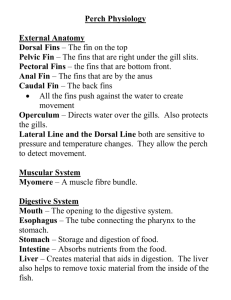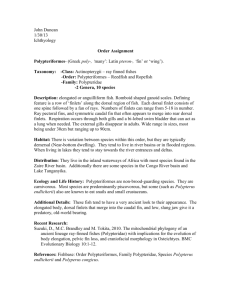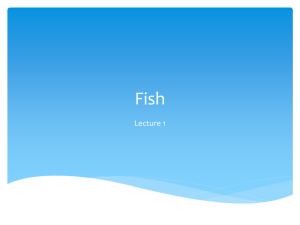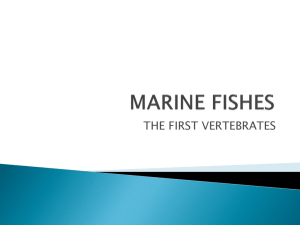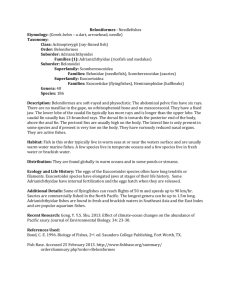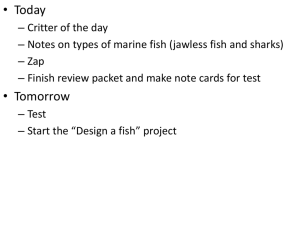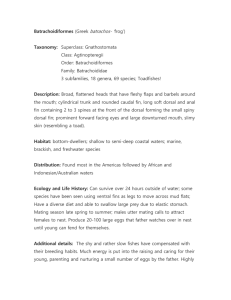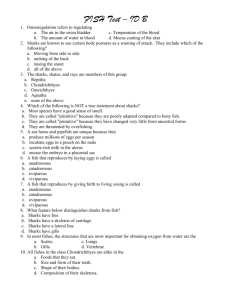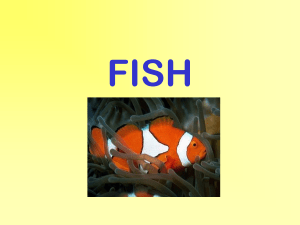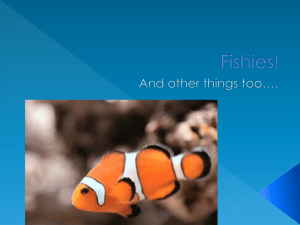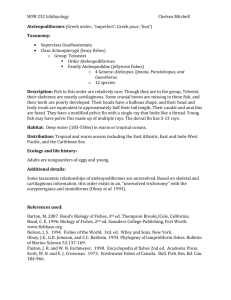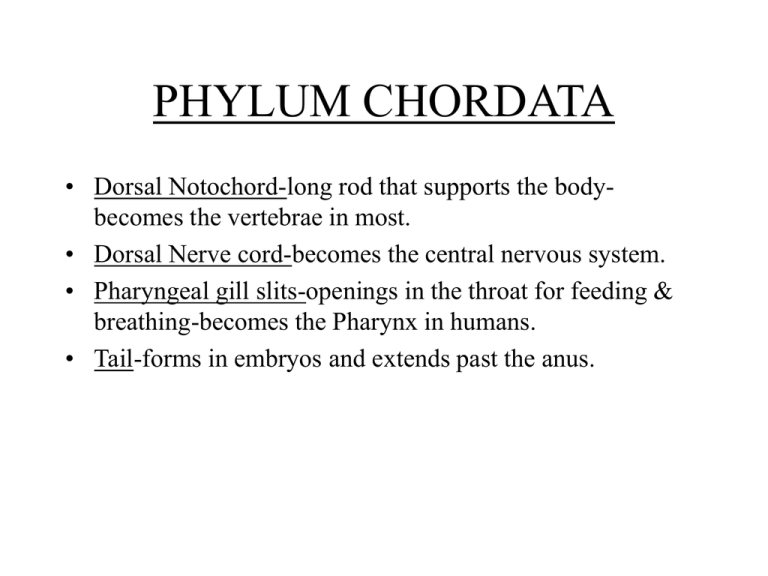
PHYLUM CHORDATA
• Dorsal Notochord-long rod that supports the bodybecomes the vertebrae in most.
• Dorsal Nerve cord-becomes the central nervous system.
• Pharyngeal gill slits-openings in the throat for feeding &
breathing-becomes the Pharynx in humans.
• Tail-forms in embryos and extends past the anus.
Evolution of Fishes
Primitive fishes lacked jaws and paired fins
Ancestral jawless fish ruled the seas during
Devonian Period: Age of Fishes
Evolution of Fishes
CLASS PISCES:
FISHES
CLASS PISCES
BECAUSE THERE
ARE 20,000 SPECIES
THERE ARE 3
SUBCLASSES
SUBCLASS
AGNATHA
(JAWLESS FISH)
SUBCLASS
CHONDRICHTHYES
(CARTILAGE)
SUBCLASS
OSTEICHTHYES
(BONY FISH)
Jawless Fishes = Agnathans
No true teeth/jaw
Skeleton made of fibers/cartilage
Cartilage-strong supporting tissue (softer/more
flexible than bone)
Lack true vertebrae (keep notochord as adults)
ONLY VERTEBRATE PARASITES!
2 groups: Lampreys and Hagfishes
Lampreys
Parasites
Sucker-like oral disks with teeth to grasp and
suck tissues/flesh
Hagfishes
Detritivores
No eyes
Toothed tongue
Secrete slime
6 hearts
Tie into knot
Hagfish
Cartilaginous Fishes =
Chondrichthyes
Sharks, Rays, Skates
Cartilage skeleton (no bone)
Sharks have thousands of teeth in rows
Skates and Rays glide with wing-like pectoral
fins (bottom-dwelling)
CARTILAGINOUS FISH
850 Species of Sharks, Rays,
& Skates
Skeleton is made of cartilage.
S-shaped swimming/rigid
fins.
External Gill slits.
Store oils & constant motion
to stay afloat.
Scales are small bony plates
(at one time used as
sandpaper).
RAYS & SKATES
Flattened body for a bottomdwelling niche
Spiracles & eyes on the
dorsal side.
Mouth, nostrils & gill slits on
ventral side.
Stingrays have a hollow barb.
Manta ray grows to 18’.
SHARKS
Close to 300 species.
Largest fish in the worldWhale Shark.
Can smell 1drop/blood
In 1 million parts/water.
Lateral line detect
vibrations in the water
Ampullae of Lorenzini
Sense changes in electrical
field.
WHALE SHARK
Bony Fishes = Osteichthyes
Bone skeleton (hard, calcified tissue)
Ray-Finned Fishes-fins formed from bony
spines covered by thin layers of skin (largest
group)
Lobe-Finned Fishes-fleshy fins with bones
(some jointed like arms/legs)…ex. Lungfish &
Coelacanth
Fish:
•Aquatic Vertebrates
•Paired Fins
Caudal fin Dorsal fin
•Scales
•Gills
Lateral line Scales Eye
Mouth
Anal fin
Pelvic fin
Pectoral fin
Operculum
(gill cover)
Feeding
Herbivores, carnivores, parasites, filter feeders,
and detritivores
Digestive tract:
mouthesophagusstomachpyloric
cecaintestineanus (solid waste)
Enzymes added by liver and pancreas
Digestive System
Intestine
Esophagus
Stomach
Liver
Pyloric cecum
Mouth
Anus
Pancreas
Respiration
Gills on sides of pharynx to exchange gases
Gill Filaments-feathery structures with
capillaries for gas exchange
Gill Rakers-prevents prey from escaping
through gills
Gill Arches-support and protect gills
Operculum-protective bony cover over gill
openings
Gills
Lungfish
Adaptation to oxygenpoor water
Tube brings oxygen
from air into fish’s
mouth to “LUNG”
Circulation
Closed system
2 chambered heart
Single loop: heartgillsbody (back to heart)
Fish Heart
Sinus Venosus-sac that collects oxygen poor
blood from veins; sends blood toAtriumlarge muscular chamber; sends it toVentriclelarge muscular chamber that pumps blood; sends
it toBulbus Arteriosus-muscular tube that
connects toAorta-large blood vessel that
sends blood to gills
Fish Heart
Sinus Venosus
Ventricle
Atrium Bulbus arteriosus
Circulation in a Fish
Gills
Body
muscle
circulation
Digestive system
circulation
Heart
Brain and
head
circulation
Excretion
Eliminate nitrogenous waste as ammonia
(urine)
Kidneys filter waste from blood
Kidney
Diffusion through gills
Response/Nervous System
•Well-developed nervous system with brain
•Eyes with color vision
•Taste/Smell
•Lateral Line System- detect currents/vibrations in water (sense
nearby fishes)
Brain
Olfactory Bulbs-smell (olfaction)
Cerebrum-smell (and voluntary
activities)
Optic Lobe-process info from
eyes
Cerebellum-coordinates body
movements
Medulla Oblongata-controls
internal organs
Olfactory
bulb
Cerebrum
Optic lobe
Cerebellum
Medulla oblongata
Movement
• Swim Bladder-internal gas filled organ to
adjust buoyancy in bony fish only
Movement continued…
Contract paired sets of muscles
Fins propel
Dorsal/Ventral fins for stability (Dorsal/Anal)
Paired fins for fine movements/turning
(Pectoral/Pelvic)
Caudal fin for speed
Reproduction
External/Internal fertilization
Oviparous-eggs (embryo) develop and hatch
outside mom’s body; obtain food from egg yolk
Ovoviviparous-eggs stay in mom’s body; obtain
food from egg yolk; young are “born alive”
Viviparous-embryos stay in mom’s body; obtain
food from mom; young are born alive
•Anadromous-live
in ocean but
migrate to fresh
water to breed; Ex.
Salmon
Migrations
• Catadromous- Breed
in the oceans but live
in freshwater
• Eels migrate to the
Sargasso Sea, they
spawn at depths of 300
meters and die when
done

